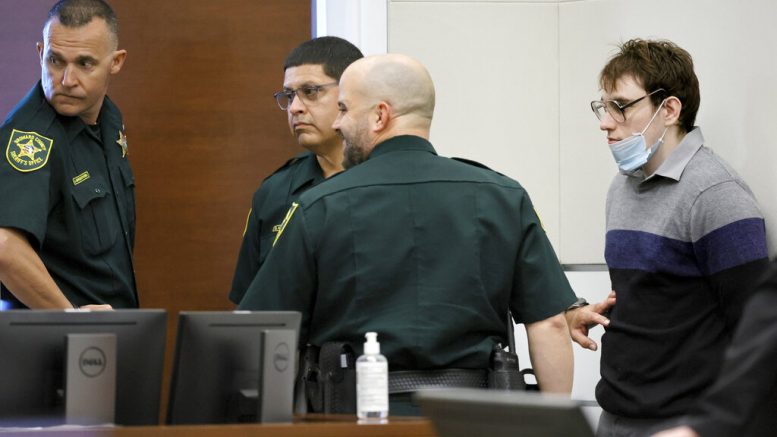FORT LAUDERDALE, Fla. (AP) — Florida school shooter Nikolas Cruz will be sentenced to life without parole for the 2018 murder of 17 people at Parkland’s Marjory Stoneman Douglas High School, after the jury said Thursday that it could not unanimously agree that he should be executed.
The jury’s recommendation came after seven hours of deliberations over two days, ending a three-month trial that included graphic videos, photos and testimony from the massacre and its aftermath, heart-wrenching testimony from victims’ family members and a tour of the still blood-spattered building.
Under Florida law, a death sentence requires a unanimous vote on at least one count. Circuit Judge Elizabeth Scherer will formally issue the sentence later.
Cruz, his hair unkempt, largely sat hunched over and stared at the table as the jury’s recommendations were read. Rumblings grew from the family section — packed with about three dozen parents, spouses and other relatives of the victims — as life sentences were announced. Many shook their heads, looked angry or covered their eyes.
THIS IS A BREAKING NEWS UPDATE. AP’s earlier story follows below.
FORT LAUDERDALE, Fla. (AP) — A jury said Thursday that it has reached a decision on whether to recommend that Florida school shooter Nikolas Cruz be executed for the 2018 massacre that killed 17 people at Parkland’s Marjory Stoneman Douglas High School.
The recommendation was not immediately released and came in the second day of deliberations, 15 minutes after jurors arrived and examined the gun Cruz used.
The decision promises an end to a three-month trial that included graphic videos, photos and testimony from the massacre and its aftermath, heart-wrenching testimony from victims’ family members and a tour of the still blood-spattered building.
The jury’s decision must be unanimous if it intends to recommend the death penalty, and if that happens, it will be up to Circuit Judge Elizabeth Scherer to make a final decision. If all jurors can’t agree on recommending death, then Cruz would get life in prison.
The jury of 12 people had asked late Wednesday to see the AR-15-style semi-automatic rifle, but the Broward County Sheriff’s Office security team objected, even though the gun has been made inoperable and Cruz’s ammunition would be removed from the jury room.
Lead prosecutor Mike Satz, who has more the five decades of experience, pointed out that in every murder case he has tried or knows, jurors got to examine and handle the weapon in their room — and he said a knife or machete is more dangerous than a gun without a firing pin. Security has never been an issue, he said.
Cruz’s attorneys had no objection to jurors seeing the gun.
Cruz, 24, pleaded guilty a year ago to murdering 14 students and three staff members and wounding 17 others on Feb. 14, 2018. Cruz said he chose Valentine’s Day to make it impossible for Stoneman Douglas students to celebrate the holiday ever again. The jury will determine only if Cruz is sentenced to death or life without parole. For Cruz to get a death sentence, the jury must be unanimous.
During the prosecution’s rebuttal case, Satz and his team argued that Cruz’s smooth movements with the gun and his ease in reloading helps show he does not have any neurological disorders, as claimed by his attorneys.
Lead defense attorney Melisa McNeill and her team have never disputed that Cruz committed a horrible crime, but they say his birth mother’s excessive drinking during pregnancy left him with fetal alcohol spectrum disorder and put him on a path that led to the shooting.
The massacre is the deadliest mass shooting that has ever gone to trial in the U.S. Nine other people in the U.S. who fatally shot at least 17 people died during or immediately after their attacks by suicide or police gunfire. The suspect in the 2019 massacre of 23 at an E l Paso, Texas, Walmart is awaiting trial.
For more national and world news, visit TheDerrick.com.








































